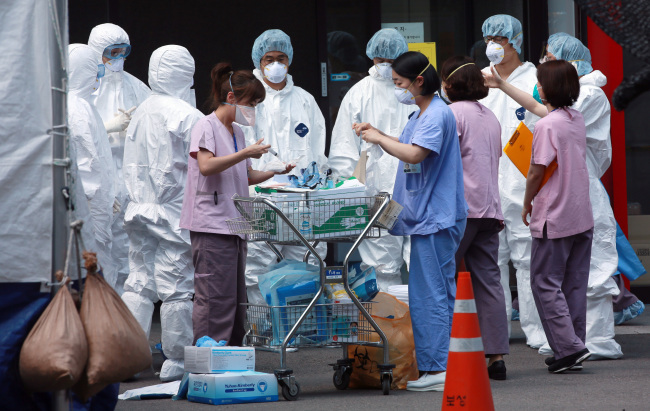The Health Ministry plans to appoint a health expert in a key leadership role in the wake of the recent Middle East respiratory syndrome outbreak.
The Ministry of Health and Welfare is headed by Moon Hyung-pyo, a former economist who has been blamed for his lack of expertise in public health ever since the MERS outbreak took place in May. The ministry’s vice minister is Chang Ok-ju, who has degrees in rather social work, women’s studies and law, but not health-related fields.
As the leaders of the ministry -- which is in charge of health and welfare policies in the country -- have been criticized for their inept handling of the MERS crisis especially during the early stages, there has been a growing concern about the lack of high-ranking government officials who specialize in health.
The Ministry of Health and Welfare is headed by Moon Hyung-pyo, a former economist who has been blamed for his lack of expertise in public health ever since the MERS outbreak took place in May. The ministry’s vice minister is Chang Ok-ju, who has degrees in rather social work, women’s studies and law, but not health-related fields.
As the leaders of the ministry -- which is in charge of health and welfare policies in the country -- have been criticized for their inept handling of the MERS crisis especially during the early stages, there has been a growing concern about the lack of high-ranking government officials who specialize in health.

The government is considering the launch of a system with two vice ministers -- one in charge of public health and the other of welfare -- for the Ministry of Health and Welfare, so there can be at least one authority figure with expertise in each of the respective policies.
The government is also considering promoting the chief of the Centers for Disease Control and Prevention, a state-run agency under the Ministry of Health and Welfare, to the vice minister level.
As some of the current administration’s key pledges were to introduce more welfare benefits especially for the growing elderly population, the government had been putting less emphasis on the nation’s public health sector before the MERS outbreak took place.
The Ministry of Health and Welfare’s budget for the welfare programs jumped by 20 trillion won -- 82 percent -- from 2010 to this year, from 23.93 trillion won to 43.44 trillion won.
However, its budget for the public health programs increased by just 1 trillion won over the same period.
South Korea reported no additional cases of MERS for the 14th consecutive day Sunday. The outbreak has killed 36 and infected 186 since the first case was reported on May 20. The spread has shown consistent signs of losing steam this month, with no new cases confirmed since July 6 and 135 patients fully recovered from the virus.
If no additional cases are reported until Aug. 2 -- four weeks since the latest case was reported on July 5 -- the outbreak in the country can be officially declared over.
Among the newly recovered patients is a Pyeongtaek-based police officer, the 119th patient. The health authorities have yet to figure out exactly how the officer contracted the virus. Although he visited a Pyeongtaek-based hospital on May 31, the same day that the 52nd patient visited the same facility, they were in the property at different times and never ran into each other.
The outbreak had a drastic impact on everyday life in Korea and the nation’s economy last month, as many avoided crowded and public spaces including shopping malls and amusement parks. The Bank of Korea forecast this month that the economic growth rate this year would slow to around 2.8 percent, down from 3.3 percent last year, citing the MERS outbreak as one of the biggest burdens.
The outbreak also had an impact on the country’s $30 billion tourism industry, as more than 124,000 tourists, most of them from China, canceled their trips to Korea last month.
The Health and Welfare Ministry had refused to share the list of MERS-affected hospitals for 18 days after the first case was confirmed in late May, and this lack of transparency has been blamed for the public fears that eventually damaged the economy. The ministry has also been accused of protecting the hospitals’ commercial interests by not sharing the information, rather than keeping the general public safe from the possible infection.
In spite of the damages, it is unclear whether the government would offer an official apology to citizens once the outbreak is declared over. Minister Moon Hyung-pyo only apologized at the National Assembly last month while being asked about the outbreak by the nation’s lawmakers, while President Park Geun-hye has never offered any words of apology throughout the health crisis.
The President made her first onsite visit to meet medical staff more than two weeks after the index MERS case was confirmed.
By Claire Lee (dyc@heraldcorp.com)










![[Hello India] Hyundai Motor vows to boost 'clean mobility' in India](http://res.heraldm.com/phpwas/restmb_idxmake.php?idx=644&simg=/content/image/2024/04/25/20240425050672_0.jpg&u=)








